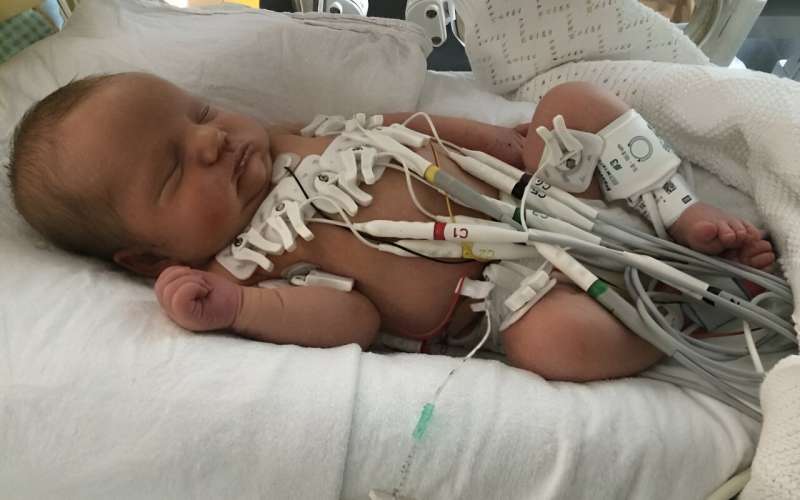This article has been reviewed according to Science X's editorial process and policies. Editors have highlighted the following attributes while ensuring the content's credibility:
fact-checked
trusted source
proofread
New blood test could prevent sudden child deaths caused by hereditary heart condition

A new blood test that could identify children with a potentially fatal heart condition has been developed by researchers at UCL and Great Ormond Street Hospital (GOSH).
Up to 1,000 children in the UK are living with a hereditary condition called hypertrophic cardiomyopathy (HCM), which causes thickening of the heart muscle. There is currently no cure and, although rare, it can cause sudden death in children and young people.
Research results published in the journal Circulation: Genomics and Precision Medicine show that the new test, measuring seven proteins in the blood, can successfully act as a marker for HCM. The test can also identify four proteins which may indicate cases where there is a greater risk of sudden death, and there are now hopes this could be developed for use across the NHS to speed up diagnosis and treatment for children with the condition.
Professor Juan Pablo Kaski, from the UCL Institute of Cardiovascular Science and Great Ormond Street Hospital, said, "Hypertrophic cardiomyopathy is the commonest cause of sudden death in children and teenagers. Although our ability to diagnose the condition has improved considerably in the last few years, many of the tests we use are expensive and may not be routinely available throughout the world. In addition, while we have also made huge advances in the identification of children with HCM at risk of sudden cardiac death, we are still looking for quicker and more accurate ways to do this.
"The development of a simple blood test to both detect the disease and identify high-risk children with HCM, if confirmed and validated, could have a major impact on the care of children with this condition."
The research was made possible thanks to Action Medical Research, LifeArc, the Peto Foundation and the NIHR GOSH Biomedical Research Centre.
Dr. Catriona Crombie, Head of the Rare Disease Translational Challenge at Lifearc, said, "Diagnosing rare diseases can be challenging but having a diagnosis can make a huge difference for patients and their families. LifeArc has been working with Action Medical Research to fund projects like this since 2019 and we hope that this will ultimately help more children get a diagnosis sooner and have better treatments that could help to save their lives."
Dr. Caroline Johnston, Senior Research Manager at Action Medical Research, said, "Funding research to further our understanding of rare diseases such as hypertrophic cardiomyopathy is important and brings hope to families. We are delighted to partner with LifeArc and work towards improving the lives of children living with HCM."
Co-author Professor Kevin Mills (UCL Great Ormond Street Institute of Child Health) said, "We need to diagnose patients earlier so we can treat them sooner for a better outcome. At present we are shutting the stable door after the horse has bolted and we need to start new therapies before patients develop symptoms. Therefore, we set out to use state-of-the-art technology to find new and better biomarkers for HCM and develop them into a test we can translate into any large NHS laboratory.
"With sufficient funding, we hope that this may be possible within two years and potentially into a simple bloodspot test that can be posted from home directly to the lab.
"At UCL, we are fortunate to have access to multidisciplinary teams, allowing researchers from various fields to collaborate and create these tests. This unique environment, with bioinformatics experts like Dr. Gaby Captur and test development specialists like Dr. Ivan Doykov, enables us to use biomarker panels with AI and machine learning to create cutting-edge tests. This represents the future of diagnostics and at UCL we are proud to be at the forefront of this research."
More information: Gabriella Captur et al, Novel Multiplexed Plasma Biomarker Panel Has Diagnostic and Prognostic Potential in Children With Hypertrophic Cardiomyopathy, Circulation: Genomic and Precision Medicine (2024). DOI: 10.1161/CIRCGEN.123.004448



















